Home of the Militant Middle, Another Opinion ("A/O") is an Independent oriented "OpEd" blog for those looking for unbiased facts free of partisan drama and who are willing to question the Status Quo.
Saturday, November 11, 2017
How Armistice Day Became Veteran's Day
On November 11th, America honors its veterans as well as its brave men and women in uniform around the world. A day known as "Armistice Day" or "Remembrance Day" until 1954, when the name was changed to "Veteran's Day". But have you ever wondered about the story behind the day? How did we come to celebrate that particular day and how its history still affects us today? Ninety-nine years ago, the Armistice ending World War I was signed. The "Great War" or "War to End All Wars" as it was euphemistically called was perhaps the bloodiest conflict the world had ever seen to date . The ceasefire was to go in effect on November 11th at 11:00 (the date and time was chosen simply because it had a "poetic quality" to it). However it wasn't until six months later that the powers involved sat down to sign the peace agreement in Paris and lasted until December 13th, whereby there would eventually be three extensions lasting until January 20, 1920, when peace was finally ratified in Europe at 4:15. It was fought with 19th Century strategy using outdated ideas and strategies which simply hadn't kept pace with the technology of war.
As a result, World War I was a war of mass slaughter, disease, poison gas, and shell shock (what we now called PSTD). It created new military terms too which became popularized in lexicon of the average man or woman, but especially for those who had been "over there"; terms like "tanks", "ace", "trench warfare", "gassed", "buzz saw" (meaning a machine gun), doughboy, "meat wagon" for an ambulance (often converted butcher wagons. hence the name). There was also "No Man's Land", U-boats, "Mustard Gas", AEF (American Expeditionary Forces), reparations and numerous more. Personal names too became popularized and the stuff of legend; names like Eddie Rickenbacker, Alvin York , John Pershing, Billy Bishop, Lusitania, and of course, Manfred von Richthofen---the feared "Red Baron".
In its wake, World War I left behind 10,080,026 million dead on the Allies' side, with approximately half of that representing civilian deaths. 12,812,271 million were wounded. The Central Powers had 8,341,264 military deaths and 2,330,00 civilian deaths. Another 8,751,85 were wounded. Even after all this time, even those numbers are considered a best guess by many as bodies were either never found or were simply unidentifiable. To put it another war, the Allies lost 36% of its military and 20% of its civilian population while the Central Powers lost 22% of its military and 22% of its civilian population.
Was it worth it? That's a question asked by millions after the war ceased, especially by those who had fought and survived the carnage. I think it was that sense of relief, pent up anxiety and anger which was the catalyst for the complete abandon that was the Roaring Twenties; fueled by ample qualities of bootleg booze. That was also the hope of the Versailles Treaty, which was flawed and full of petty jealousy, nationalistic arrogance, and misplaced blame which merely reset the stage for the next war, which was to come a mere short quarter century later, and it was to be bloodier than the first. The war had not just destroyed millions of lives but also billions of dollars in property damage. The actual total cost of war to the Central Powers was $60,643,160,000. The costs to the Allies was even higher, $125,690,477,000. It's hard to imagine such carnage and costs would be tolerated by any the citizens of any country today. The war also destroyed empires.
The fate of the Central Powers was now be determined by its vengeful former enemies. As an aside, Germany did not expect to be treated as a belligerent power. It was argued by Germany's representatives that Germany had merely honored its treaty with Austro-Hungary, which was no different than how the other great powers of Europe had done. Germany, now a republic following the abdication of the Kaiser, was given the impression that it would be treated as an equal at the table. It would be out of this that the infamous "Stab-in-the-Back" myth would arise since it was left to the representatives of the newly formed democratic republic to negotiate as a defeated nation. The irony was the majority party of the Republic was the Socialist Democrats, with most of its leadership being Jewish.
Gone now was the Imperial German Empire, and with it, the Prussian mystique Alsace-Lorraine, and Germany's industrial heartland---the Ruhr Valley. The industrial Saar Region and City of Danzig were under the control of the League of Nations. Northern Schleswig went to Denmark, West Prussia and Silesia were given to Poland, the Hultschin District went to Czechoslovakia while the territory of Memel was absorbed by Lithuania. Belgium acquired Eupen and Malmedy. Control of the Rhineland was given to the French< Germany faced the destruction of its air force and emasculation of its navy and army. All toll, Germany lost 13% of its territory---27,000 square miles and 1/10 of its population (about 7 million people) plus all of its colonies. As if that wasn't severe enough, Germany was ordered to pay war reparations---a "fine" of sorts" in the amount of 132 billion gold Marks, or an equivalent of US $33 billion dollars; all for a war Germany never started. The Austro-Hungarian Empire of the Hapsburgs ceased to exist. It lost close to 2/3 of its total territory. Austria and Hungary were divided. Six regions were formed into the nation of Czechoslovakia. Seven other regions were to make up the new nation of Yugoslavia. Meanwhile, Transylvania and Bukovina were ceded to Romania. Tyrol and Trieste were handed over to Italy. Galicia, Orava, Spitz, and the Duchy of Cieszyn were handed over to Poland. Restrictions were also placed in their respective militaries.
The Ottoman Empire too was gone. Its territories fell to France and England, which added to their empires. Out of this would come the Mandate of Palestine, Lebanon, Syria, and Mesopotamia. Greece, Georgia, Yemen, and Armenia regained its independence for the Ottomans. The Emirate of Transjordan, the creation of Saudi Arabia and the British Protectorates of Kuwait, Bahrain, and Qatar and control of the island of Cyprus. The newly created nations, formed by France and England, took little regard for the religious, ethnic, or tribal differences. Later, following WWII, the British would bow to international pressure and recent history, and begin allowing Jewish survivors of the Holocaust to migrate into Palestine, which ignited a fuse that has caused grave consequences ever since.
Imperial Russia's empire crumbled first, in 1917, when Czar Nicholas II, of the Romanov Dynasty, abdicated and the Imperial government was overthrown by a Provincial Government headed by Alexander Kerensky; a lawyer, social activist, and member of the Socialist Revolutionaries (the "SRs").Despite his attempts at reform, Czar Nicholas's efforts proved to be too little or too late. In October/November of that same year Lenin's Bolsheviks had seized control of the government. Russia withdrew from the war after signing the Brest-Litovsk Treaty with Imperial Germany. The price of peace was extremely high. Russia was forced to forfeited a large swath of land, one quarter of its population, and nine-tenths of its coal mines.
In order to force Russia to remain in the war, the Allied Powers--primarily Britain and the US, invaded Russia at the port of Archangel. However, the invasion made little headway, and the troops were withdrawn. Russia descended into a Civil War which would leave millions dead. Many more died of starvation afterwards as the economy collapsed. The Czar, his wife Alexander, their family, and several ministers would among the war's victims. By 1921/22, Lenin had enacted the New Economic Program (or NEP), which permitted a limited ownership of land and private enterprise. The result bore almost instance positive results to the economy (Lenin's long term economic and political objectives, despite popular myths, was to "shrink the government down to the size of a post office"; to create a country devoid of bureaucrats and one of self-government and volunteer ad hoc committees to run the country). However, with Lenin's death in 1922, the Georgian, Joseph Stalin, was able to consolidate power and began remaking Russia in his own imagine. The result would prove disastrous for Russia...and the world.
England and France didn't escape unscathed. While they, along with the US, dictated terms to their former foes, and acquired vast amounts of land, resources, colonies, and resources, while reducing the once mighty German Empire to the status of a second tier nation. Efforts could now be focused on calculating the value of their gains, while playing lip service to President Woodrow Wilson and his League of Nations (neither major power had any real interest in ceding power to anyone, let along an upstart country like the US). Nevertheless, League of Nations aside, America proved she was a first class industrial power with her own colonies thank you very much. It was American effort which turned the tide of war away from the Central Powers and to the Allies.
But for England, its victory was bittersweet. It was said that the "Great War" had cost the Empire an entire generation of men, which wasn't far from the truth, just over 886,000 men. It still remained the strongest naval power in the world, especially now that Germany's was hamstrung thanks to tonnage restrictions loss of its U-boat fleet, not to mention the destruction of its air force. Ireland was successful in obtaining its independence from England in 1916 (with the exception of Ulster). Far off colonies were again stirring amid talk about their own independence, yet just around of 25% of the world's land mass was under the British Union Jack flag. England's economy too had been affected, and it had to turn its attention to rising unemployment and poverty, not to mention the flu epidemic which was to cost many more lives. While the sun hadn't yet set on the British Empire, there was very much a chill in the air.
Perhaps France fared the best of the nations. It had picked up some valued territory thanks to Germany and the Ottoman Empire; land which could prove quite valuable with the additional shipping routes and strategic ports, along with a new and growing energy source---oil. True, France took a beating in terms of devastated towns and cities, but the revenues generated from the new colonies should, in time, make up for it. France had also lost an estimated 1,400,000 individuals. It had also made up for its humiliating defeat at the hands of Kaiser Wilhelm I and his imposing Chancellor, Otto von Bismarck. However, France too was beginning to feel the pangs of independence from her colonies.
As for the League of Nations, championed by President Wilson, it's fate would be little better than that of the Central Powers. Neither France or England were going to surrender their global dominance and submit to the discretion of nations they consider their inferior, and I suspect that included the United States, who was just now beginning to emerge as a player on the world stage whereas both France and Great Britain had held the world's attention for centuries now. Other powers such as Spain, Portugal,and Holland were mere shadows of their former selves.
Nevertheless, the US really wasn't really a factor since Wilson's own Congress voted not to approve its membership. Ultimately, however, 63 nations would join the League. It's goal was a noble one; to formulate a forum to discuss and debate issues such as world peace, child labor, gradual disarmament, women's voting rights, ways to improve international relations, working conditions and safety issues, as well as ways to impose enforcement of agreements among member nations (such as economic sanctions). Although the League of Nations would continue to remain in existence until April 18, 1946 when it was replaced by the new United Nations, its chief failure was its inability to enforce its resolutions, especially on non-member nations. The United Nations would, in many respects, address and correct some of these shortfalls, yet many of the issues still remain, especially as they related to national sovereignty.
So, now you know the back story to Veteran's Day; a day to acknowledge and honor our men and women in uniform and our veterans. We also must remember those who have fallen in their defense of this country (which is the reason behind Memorial Day) as well as those who are still missing. In my opinion, one cannot and should not be separated from the other.
The Financial Costs of the First World War
World War One Centennial Gallery
Subscribe to:
Post Comments (Atom)



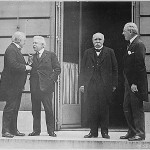
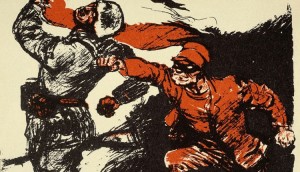
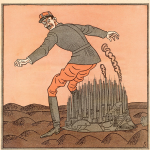




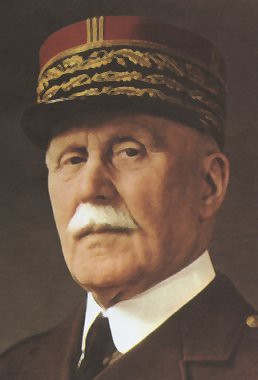
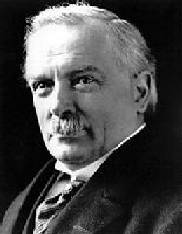



No comments:
Post a Comment